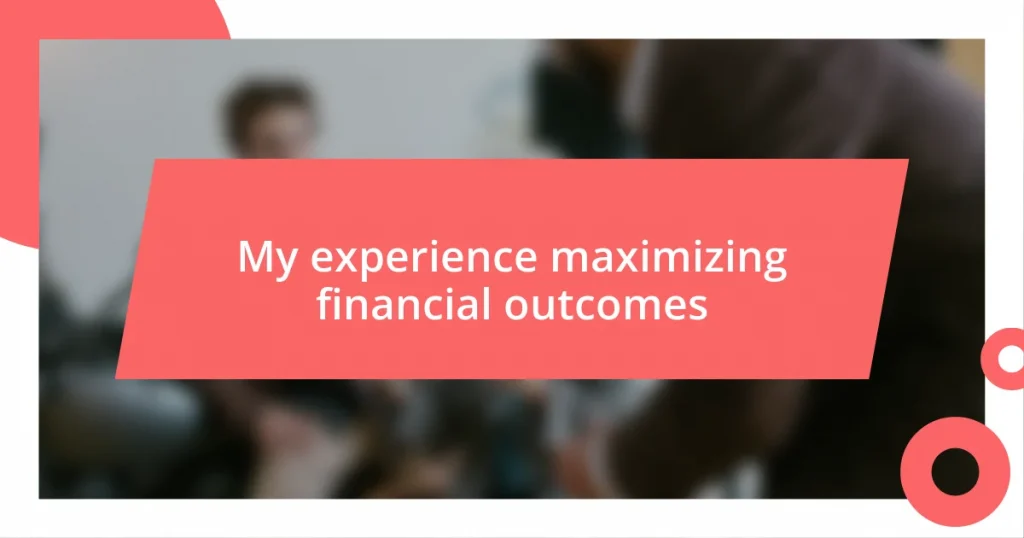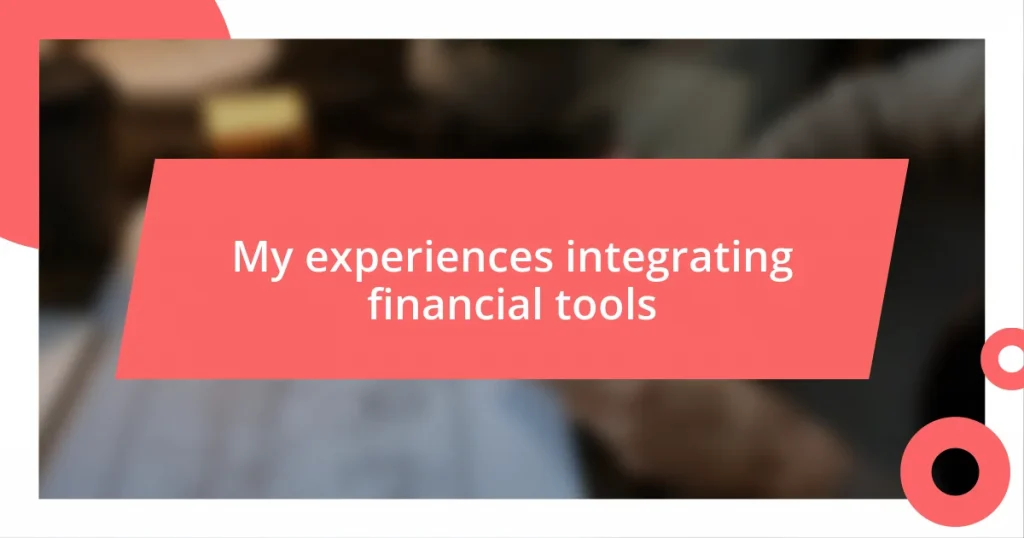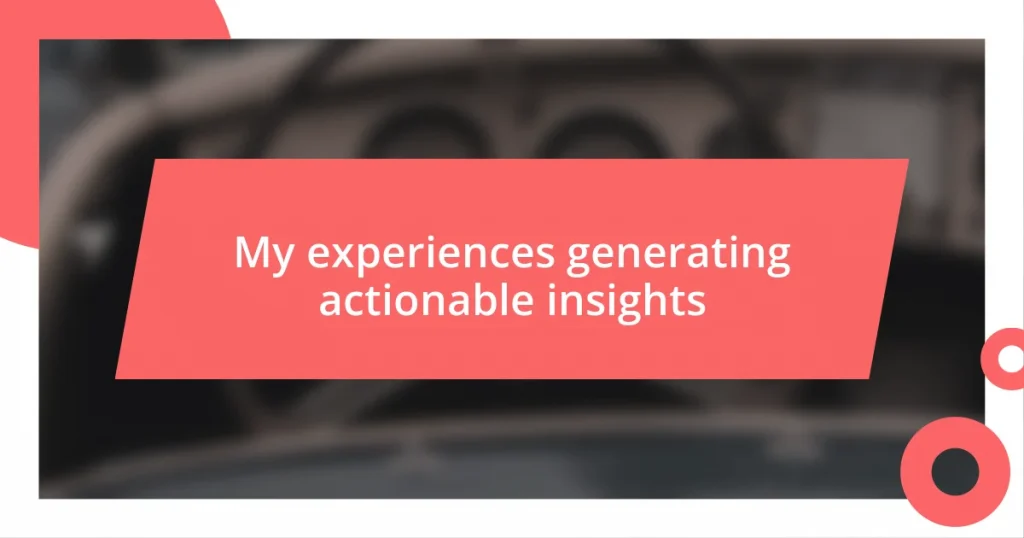Key takeaways:
- Understanding financial goals involves breaking them down into manageable pieces and aligning them with personal priorities for a fulfilling financial journey.
- Regularly assessing your financial situation—including income, expenses, and debts—provides clarity and foundation for better decision-making.
- Tracking and adjusting financial strategies is essential; embracing flexibility can lead to improved outcomes and resilience in managing financial health.
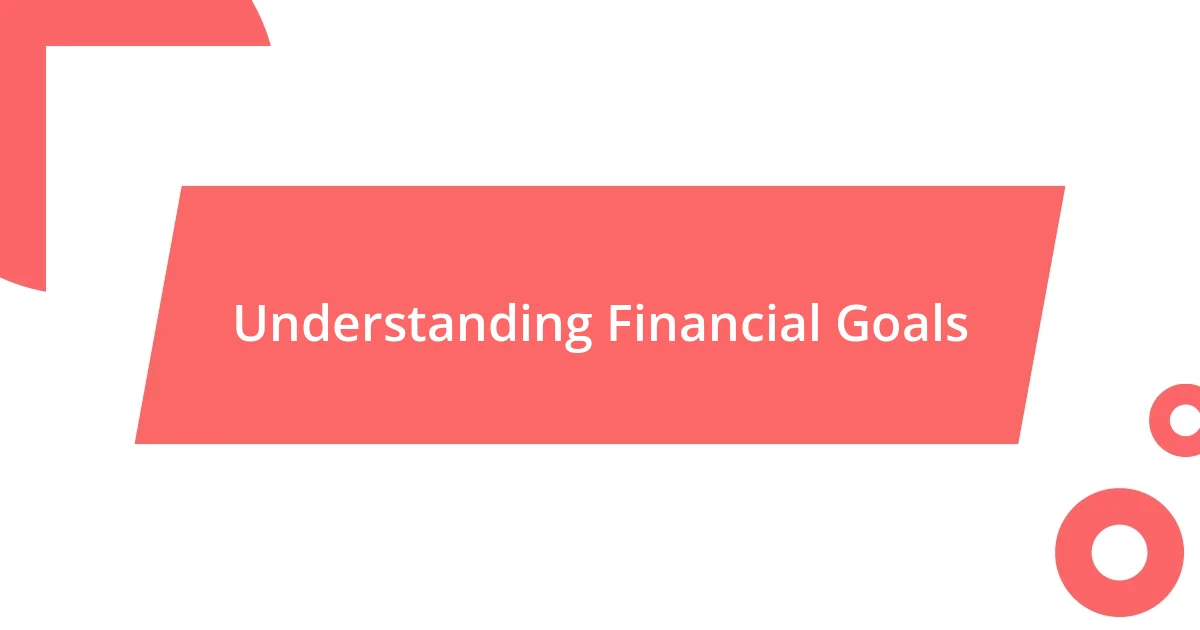
Understanding Financial Goals
Understanding financial goals is a deeply personal journey for each of us. I remember when I first sat down to define my own goals; it felt overwhelming. I realized, though, that breaking them into smaller, manageable pieces made the process much less daunting. Have you ever felt the weight of financial uncertainty? It’s easy to feel lost without a clear direction.
In my experience, financial goals should reflect what truly matters to you. For example, while saving for a house was my initial focus, I discovered that building a travel fund sparked more joy in my life. What do you value most in your financial journey? By identifying priorities, it becomes easier to allocate resources to what resonates with your desires.
Additionally, achieving financial goals requires a balance between ambition and realism. I once aimed to save significantly more than what was feasible, leading to disappointment. Instead, I set achievable, incremental targets that felt rewarding. How about you? Finding that sweet spot between aspiration and practicality plays a crucial role in maintaining motivation throughout the journey.
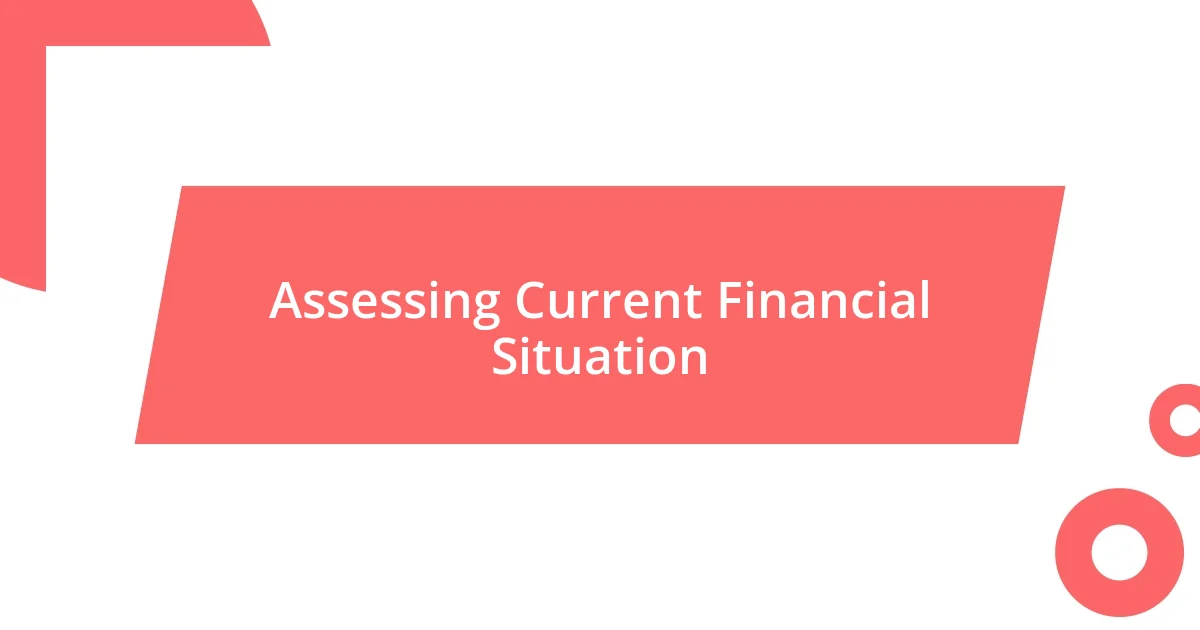
Assessing Current Financial Situation
Taking a close look at your current financial situation is the first step in maximizing outcomes. I remember grappling with my own financial reality — it was tough to confront my spending habits and debt levels. Yet, after the initial discomfort, I found clarity in understanding where I stood. That assessment laid the groundwork for better decision-making moving forward.
Here are key elements I focused on during my assessment:
- Income Sources: Identifying all streams of income, including salary, freelance work, or investments.
- Expenses: Tracking monthly expenses to understand where my money was going.
- Debt Analysis: Listing all debts with interest rates, repayment schedules, and remaining balances.
- Savings and Investments: Evaluating existing savings accounts and investment portfolios to gauge growth and risk levels.
- Net Worth Calculation: Summing up assets and liabilities to establish a clear picture of financial health.
It’s amazing how revealing these numbers can be. Reflecting on my net worth was sobering, but it fueled my desire to improve my situation. Have you calculated yours? It’s a crucial part of the journey.
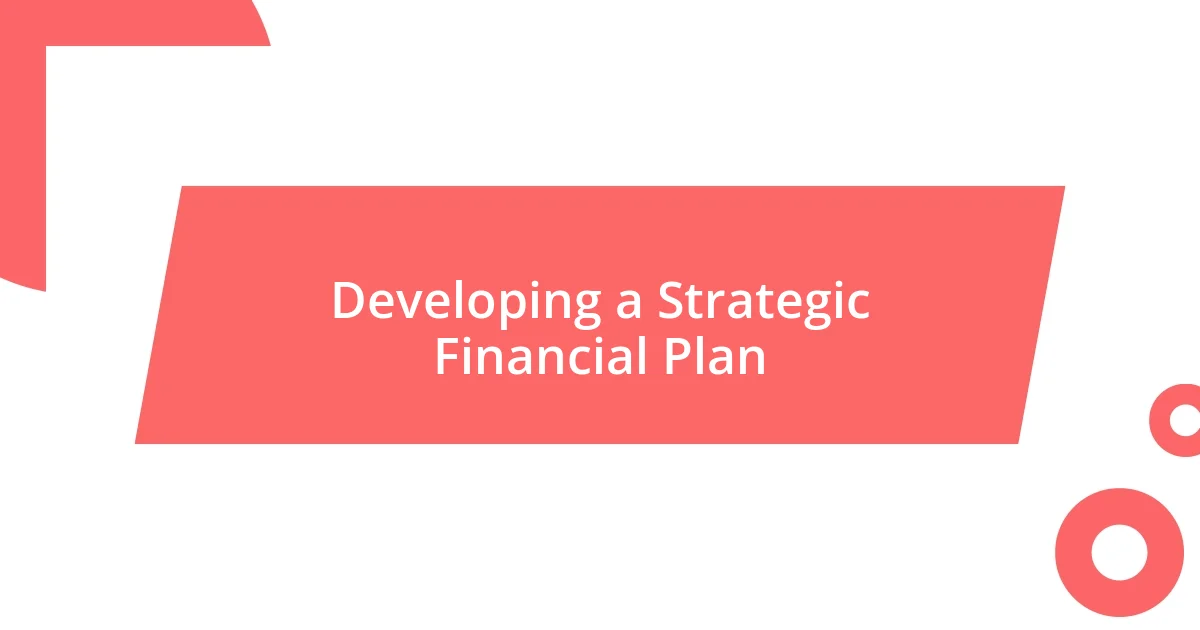
Developing a Strategic Financial Plan
Developing a strategic financial plan is an essential step toward achieving long-term financial success. When I crafted my plan, I discovered the importance of aligning each financial decision with my overarching goals. I began with clear priorities, like saving for retirement and a future home. I learned that prioritization helps to streamline efforts. Have you prioritized your financial goals?
Budgeting became my best ally in this journey. I always remember each time I balanced my budget; it was like a mini victory that kept me motivated. I often jotted down my monthly income versus expenses and made adjustments to stay on track. It’s crucial to remain flexible in your planning because life is unpredictable. What strategies do you use to stay within your budget?
One element I’ve found valuable is regularly reviewing and adjusting my plan. Life changes—be it a job promotion or an unexpected expense—necessitate updates to your strategy. I recall a time when an unforeseen medical bill forced me to reevaluate my financial priorities. This adaptability has been vital in keeping me focused. Have you considered how you might need to pivot your strategy over time?
| Element | Importance |
|---|---|
| Prioritization | Ensures resources are directed toward what matters most |
| Budgeting | Helps track income and expenses for better financial control |
| Regular Reviews | Adapts to life changes and keeps goals relevant |
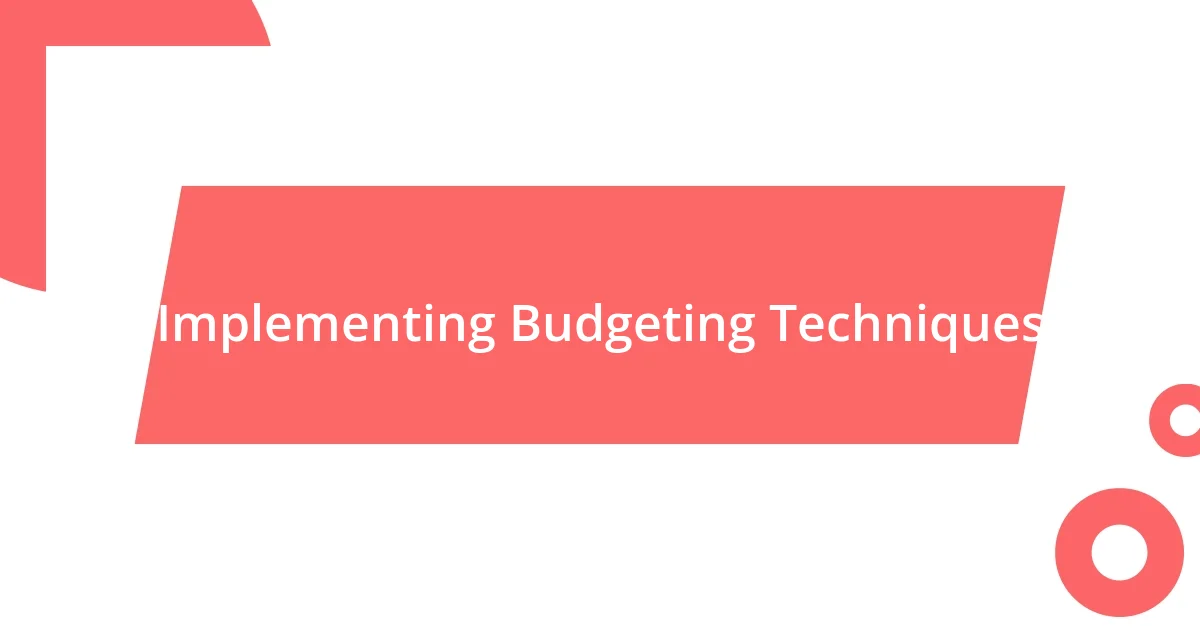
Implementing Budgeting Techniques
Once I embraced budgeting techniques, my financial landscape transformed significantly. I recall sitting down with a notebook, meticulously listing my income and expenses, feeling both anxious and liberated. The real breakthrough came when I adopted the 50/30/20 rule. This approach, which allocates 50% of income to needs, 30% to wants, and 20% to savings, gave me structure and clarity. Have you ever felt overwhelmed by expenses? This framework helped me regain control and make conscious spending choices.
Another budgeting technique I found immensely helpful was the zero-based budget. Each month, every dollar I made had a purpose, whether it was spending, saving, or investing. I vividly remember my first month trying this method; I had to confront each discretionary purchase—was that coffee really necessary? The satisfaction of knowing every cent was accounted for made me feel empowered and disciplined. Have you tried assigning a purpose to each dollar you earn?
Additionally, utilizing budgeting apps changed the game for me. I started tracking my finances digitally with a simple app, which made monitoring my spending habits both easy and fun. I was constantly surprised by where my money went. With notifications to remind me of my spending limits, I felt accountable. How do you track your financial progress? Embracing technology helped me stay on top of my budget and fostered a sense of achievement every time I met my financial goals.
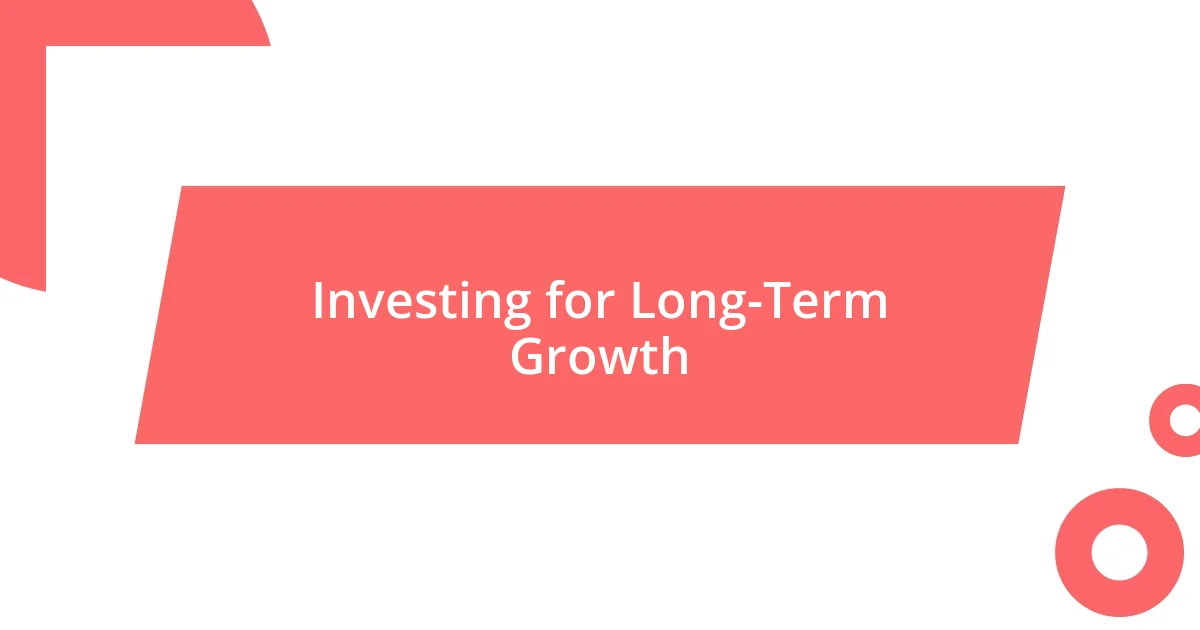
Investing for Long-Term Growth
Investing for long-term growth has been a remarkable journey for me. I remember opening my first investment account, and the mix of thrill and uncertainty was palpable. The decision to put money into stocks felt a bit like jumping into the deep end of a pool—exciting but a little scary. Have you ever taken that leap? I found that doing thorough research beforehand helped calm my nerves. Understanding companies and markets not only prepared me but fueled my confidence.
Over time, I’ve seen the immense benefits of diversifying my investments. Instead of putting all my eggs in one basket, I learned to spread my investments across different sectors and asset classes. I recall a particular moment when I decided to invest in a green energy company, which not only aligned with my values but also paid off handsomely. Isn’t it reassuring to know that you’re contributing to something bigger while also growing your wealth? That combination of ethical investing and financial gain keeps me motivated.
Another lesson I picked up along the way is the importance of patience in the investing game. Early on, I was tempted to check my portfolio daily, driven by the highs and lows of market fluctuations. It took some time, but I realized that real success comes from a longer perspective. When I finally stepped back and focused on the bigger picture, I felt a sense of relief. Do you think patience plays a role in your financial decisions? For me, embracing this viewpoint transformed my approach, allowing me to weather market storms with a solid mindset.
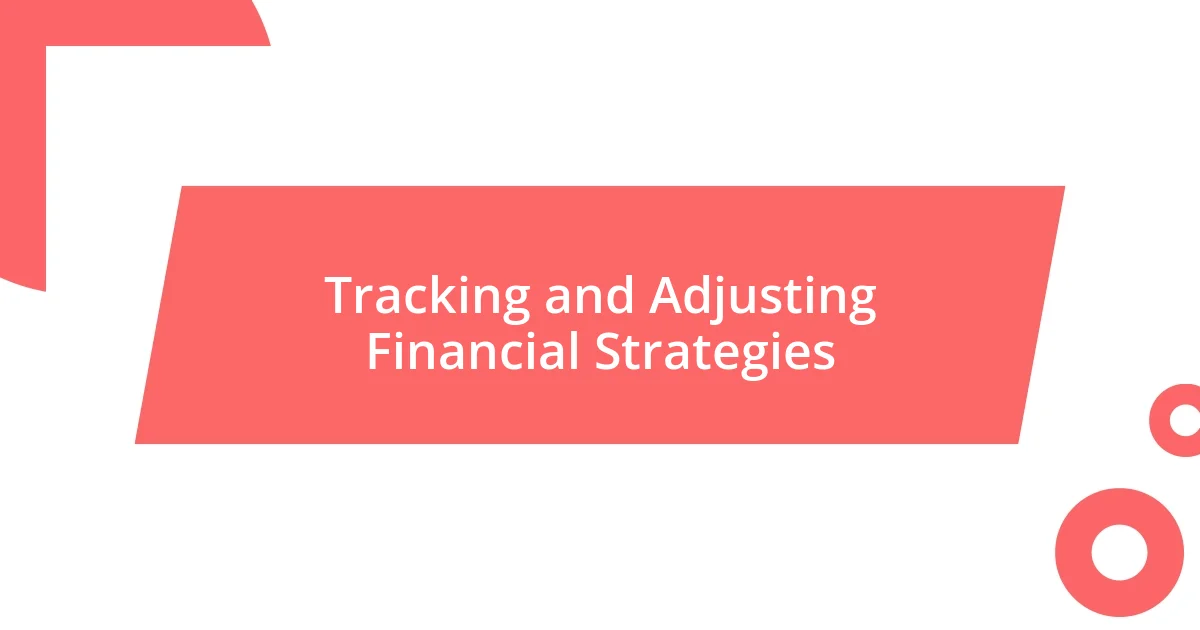
Tracking and Adjusting Financial Strategies
Tracking my financial strategies has been a game-changer in how I view my economic health. I remember the first time I reviewed my monthly expenses after a few months of budgeting. I was shocked to discover how often I overspent on dining out. It was eye-opening! Have you ever been surprised by your spending habits? Now, I regularly set aside time to evaluate my financial moves, and this really helps me stay on track.
Adjusting my strategies has also become an essential part of my financial routine. For instance, when I noticed my savings account wasn’t growing as expected, I took action by reallocating funds to higher interest accounts or exploring investment options—something I had previously hesitated to do. This proactive approach not only boosted my savings but also enhanced my understanding of financial products. Have you ever thought about how small adjustments can lead to significant outcomes? It’s fascinating what happens when you make intentional changes.
I’ve learned to embrace flexibility in my financial planning. Life is unpredictable, and my circumstances can shift quickly. One month, I had a big expense due to car repairs, which meant I had to cut back on discretionary spending. During that time, adjusting my budget felt daunting, but I found strength in seeing it as an opportunity to re-evaluate my priorities. Does it make you nervous to adapt your budget? For me, this adaptability has fostered resilience and ultimately led to more robust financial health.
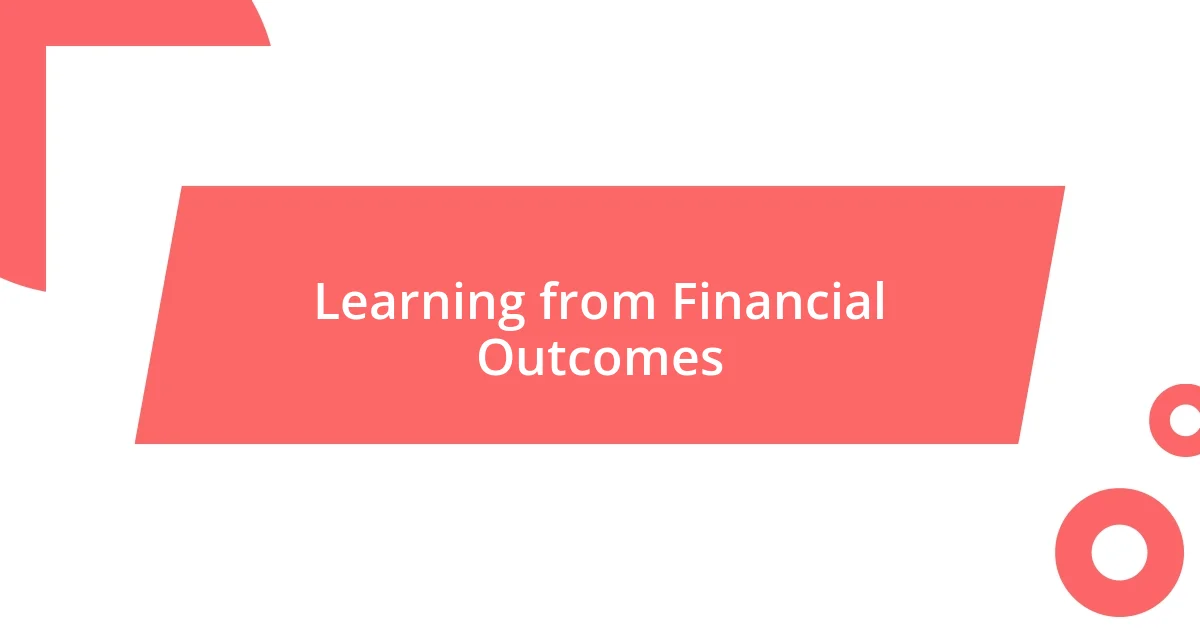
Learning from Financial Outcomes
Reflecting on my financial outcomes has been enlightening. I distinctly remember a year when I invested heavily in a tech startup that was all the buzz. The excitement of that decision quickly turned into disappointment when the company struggled. That experience taught me the importance of due diligence and understanding the long-term viability of an investment. Have you ever faced a similar setback that made you rethink your strategy?
One of the most powerful lessons I’ve learned is the significance of utilizing my financial outcomes as feedback. After recognizing some underperforming assets, I felt compelled to reassess my investment philosophy. I began to ask myself tough questions about what went wrong and how I could make better choices in the future. This self-reflection process turned out to be invaluable—how often do you take a step back and truly analyze your financial decisions?
I’ve also found that sharing insights from my financial experiences with others can be incredibly rewarding. I once participated in a finance workshop and shared my journey of learning from losses. Seeing others nodding and relating to my story reminded me that we aren’t alone in this journey. It’s remarkable how collective learning can enhance our financial outcomes. Do you share your financial lessons with your peers? For me, it has not only helped others but reinforced my own insights.










